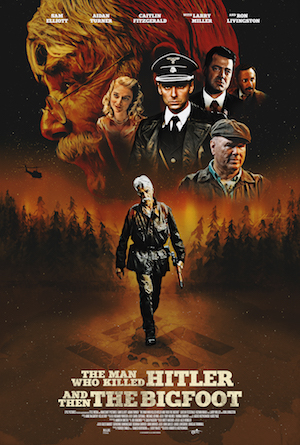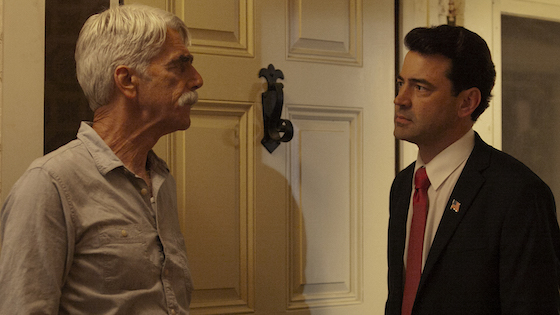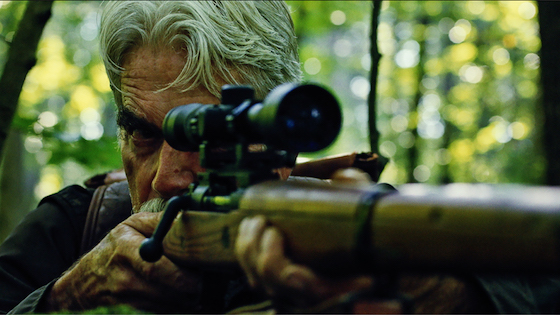

[Rating: Minor Rock Fist Down]
A diabolical sleight-of-hand trick that suckers its audience in with promises of mayhem spanning two different genres, The Man Who Killed Hitler and Then the Bigfoot has redefined what is possible in the realm of cinematic let-downs.
Skimping on the Hitler and Bigfoot action only to delve into the heart of a man living a very contrite and clichéd life, writer/director Robert D. Krzykowski has crafted a film that fails to deliver on the admittedly intriguing promise of its title. Yes, this is about a man that kills both Hitler and Bigfoot, yet rather than focus on those two very intriguing morsels, it instead unspools a painfully basic love story. The result is a film that fails to live up to the expectations of its premise and isn’t going to win over any rom-com devotees with its tired-ass romance, either.
The Man Who Killed Hitler and Then the Bigfoot jumps back and forth between an ill-defined 1980s setting, and the memories of its lead, Calvin Barr (Sam Elliott). Calvin spends his present-day 80s life bouncing around his empty house with his loyal dog while his evenings are occupied by an informal residency at the local watering hole. Calvin often thinks back to the years surrounding World War II, when he courted a local schoolteacher, and later, worked as a spy of sorts for the U.S. government: scenes from which pop into the narrative as flashbacks. It’s a bit of a slog, for a great deal of time is devoted to an unpacking of Calvin’s life over the course of about 40 minutes that could have just as easily been condensed into 5-10 with some decent writing.
This isn’t the case, though, as the film very nearly reaches its halfway point before it gets around to establishing the eponymous conflict: a Bigfoot hunt that holds the fate of the world in its hands. A government agent (Ron Livingston) approaches modern-day Calvin to let him know that the only man who could possibly track and kill Bigfoot is the same guy who murdered Hitler…or is it because Calvin has a rare immune system mutation that allows him to be near Bigfoot without getting sick? The movie never makes up its mind, but Calvin DID kill Hitler, and DOES have a one-in-a-billion immunity to the disease that Bigfoot is spreading, so he goes off to find ol’ Sasquatch.

It’s a clumsy set-up, yet it is fitting considering the rushed nature of the Hitler and Bigfoot storylines, both of which factor into the story far too little considering their place in the goddamned title of the film. Far more time is spent inside Calvin’s head, where he relives and reconsiders decisions made as a younger man, when he turned his back on his family and beloved in service to his country. This is a somewhat interesting albeit played-out theme that has only the most tenuous connection to the narrative despite its dominating presence in the film.
And that’s the problem (or at least the most bracing one).
If you’re going to sucker in an audience with promises of Hitler and Bigfoot-related homicides, only to then bait-and-switch them with a romance yarn, then that love story better be fire. This is not what’s going on here, however. The particulars of Calvin’s relationship with his lady doesn’t offer a new take on the departing-soldier “I’ll wait for you” formula, and is more anti-climactic than either the Bigfoot or Hitler portions (and that’s saying something). What the audience has, then, is a bargain-bin romance ditty attached at the hip to a B-movie monster jag. Neither is particularly good on its own, and they do nothing to complement each other in either a thematic or narrative sense.
There is a considerable amount of effort devoted to making Calvin a fully realized, complex character by way of his bygone romance, but also his relationship with a younger brother, Ed (Larry Miller), yet none of it ever really comes together. The Man Who Killed Hitler and Then the Bigfoot spends far too little time killing dictators and mythical beasts to satisfy those who bought a ticket for that, and not enough creativity establishing a new take on the lonely old warrior trope to make that detour worthwhile.

Sam Elliott does a fine job internalizing and radiating the silent emotional trauma the script pulls out of him like so many sore teeth, yet there’s little in the way of a payoff for his character. Exacerbating things, the Hitler portions are rushed, and the Bigfoot hunt is a mish-mash of bad editing, piss-poor make-up/costuming, and amateur-hour action staging. Krzykowski seems to be groping around for something more profound than what’s on display, here, yet never manages to tie the strands of his two timelines together in any satisfying way.
As it stands, the film feels like a house painted two different colors: one for each half. From a distance, if only looking at one side of the thing, it might appear normal (if uninspired); if a person is taking in this house from a vantage that allows for the complete picture, however, it just seems schizophrenic and at war with itself. Maybe one day, Krzykowski will figure out a way to blend these two different palettes in a satisfying way, but as it stands with The Man Who Killed Hitler and Then the Bigfoot, the effort feels like the mismatched eyesore that it is.





Comments on this entry are closed.